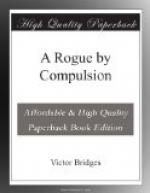I was not close enough to overhear the directions which he gave to the driver, but unless his habits had changed considerably the chances were that he was off to lunch at his club. Anyhow I felt pretty certain that I could pick up his trail again later on at the office if I wanted to. For the moment I had other plans; it was my intention to follow George’s example and pay a short call upon “Mademoiselle Vivien.”
I walked back, and throwing away the end of my cigar, entered the doorway again and started off up the stairs. I imagined that by going as an ordinary client I should find no difficulty in getting admitted, but if I did I was fully prepared to bribe or bluff, or adopt any method that might be necessary to achieve my purpose. I would not leave until I had at least seen the gifted object of George’s midday rambles.
I reached the second landing, where I was faced by a green door with a quaintly carved electric bell in the shape of an Egyptian girl’s head, a red stone in the centre of the forehead forming what appeared to be the button. Anyhow I pressed it and waited, and a moment later the door swung silently open. A small but very alert page-boy who looked like an Italian was standing on the mat.
“Is Mademoiselle at home?” I inquired.
He looked me up and down sharply. “Have you an appointment, sir?”
“No,” I said, “but will you be good enough to ask whether I can see her? My name is Mr. James Nicholson. I wish to consult her professionally.”
“If you will step in here, sir, I will inquire. Mademoiselle very seldom sees any one without an appointment.”
He opened a door on the right and ushered me into a small sitting-room, the chief furniture of which appeared to be a couch, one or two magnificent bowls of growing tulips and hyacinths, and an oak shelf which ran the whole length of the room and was crowded with books.
While the boy was away I amused myself by examining the titles. There were a number of volumes on palmistry and on various branches of occultism, interspersed with several books of poetry and such unlikely works as My Prison Life, by Jabez Balfour, and Melville Lee’s well-known History of Police.
It gave me rather an uncanny feeling for the moment to be confronted by the two latter, and I was just wondering whether a Bond Street palmist’s clientele made such works of reference necessary, when the door opened and the page-boy reappeared.
“If you will kindly come this way, sir, Mademoiselle will see you,” he announced.
I followed him down the passage and into another room hung with heavy curtains that completely shut out the daylight. A small rose-coloured lamp burning away steadily in the corner threw a warm glow over everything, and lit up the low table of green stone in the centre, on which rested a large crystal ball in a metal frame. Except for two curiously carved chairs, there was no other furniture in the room.




